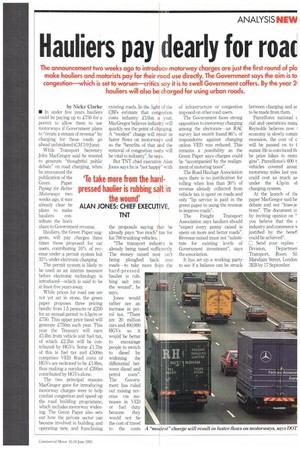Hauliers pay dearly for roai
Page 21

If you've noticed an error in this article please click here to report it so we can fix it.
The announcement two weeks ago to introduce motorway charges are just the first round of pia make hauliers and motorists pay for their road use directly. The Government says the aim is to congestion—which is set to worsen—critics say it is to swell Government coffers. By the year 21 hauliers will also be charged for using urban roods.
by Nicky Clarke
• In under five years hauliers could be paying up to £750 for a permit to allow them to use motorways if Government plans to "create a stream of revenue" by charging for these roads go ahead unhindered (CM 3-9 June).
While Transport Secretary John MacGregor said he wanted to generate "thoughtful public debate" on road charging, when he announced the publication of the
Green Paper Paying for Better Motorways two week's ago, it was already clear he plans to make hauliers contribute the lion's share to Government revenue.
Hauliers, the Green Paper suggests, will pay charges three times those proposed for car users, contributing 10% of revenue under a permit system but 33% under electronic charging.
The permit system is likely to be used as an interim measure before electronic technology is introduced—which is said to be at least five years away.
While prices for road use are not yet set in stone, the green paper proposes three pricing bands: from 15 penceJm or 1250 for an annual permit to 45p/m or £750. This upper price band will generate £750m each year. This year the Treasury will earn £14bn from vehicle and fuel tax, of which £22bn will be contributed by HGVs. Some £1.7bn of this is fuel tax and £500m comprises VED. Road costs of HGVs are reckoned to be £1.8bn, thus making a surplus of £395m contributed by HGVs alone.
The two principal reasons MacGregor gave for introducing motorway charges were to help combat congestion and speed up the road building programme, which includes motorway widening. The Green Paper also sets out how the private sector can become involved in building and operating new, and franchising existing roads. In the light of the CBI's estimate that congestion costs industry .C15bn a year, MacGregor believes industry will quickly see the point of charging. A "modest" charge will result in faster flows on motorways and so the "benefits of that and the removal of congestion costs will be vital to industry", he says.
But TNT chief executive Alan Jones says he is "not happy" with the proposals saying that he already pays "too much" tax for his 700 trunking vehicles.
"The transport industry is already being taxed sufficiently. The money raised now isn't being ploughed back into roads—to take more from the hard-pressed haulier is rubbing salt into the wound", he says.
Jones would rather see an increase in petrol tax. "There are 20 million cars and 400,000 HGVs so it would be better to encourage people to switch to diesel by widening the differential between diesel and petrol costs". The Government has ruled out raising revenue via increases in VED or fuel duty because they would not tie the cost of travel to the costs A "modest" charge will result in faster flows on motorways, says DOT . . H FREIGHT
5ERVJCEG
NOTTI NGHAM
TEL TELEX 6571 ,
of infrastructure or congestion imposed on other road users.
The Government faces strong opposition to motorway charging among the electorate—an RAC survey last month found 86% of respondents against charging unless VED was reduced. This remains a possibility as the Green Paper says charges could be "accompanied by the realignment of motoring taxes".
The Road Haulage Association says there is no justification for tolling when less than 30% of revenue already collected from vehicle tax is spent on roads and only lip service is paid in the green paper to using the revenue to improve roads".
The Freight Transport Association says hauliers should "expect every penny raised is spent on more and better roads". Revenue raised must not "substitute for existing levels of Government investment", says the association.
It has set up a working party to see if a balance can be struck between charging and ar to be made from them.
Pan..vIforce national {. cial and operations marl Reynolds believes now economy is slowly commn recession, the cost of c will be passed on to t sumer. He is convinced th be price hikes to resto gins". Parcelforce's 600 t vehicles covered aroun motorway miles last yea could cost as much as under the 4.5p/m el charging system.
At the launch of tiv paper MacGregor said he debate and not "knee-je tions". The document cc by inviting opinion on " you believe that the c industry and commerce v justified by the benefi could be achieved".
E Send your replies Division, Departmen Transport, Room S5 Marsham Street, London 3EB by 17 September.












































































































